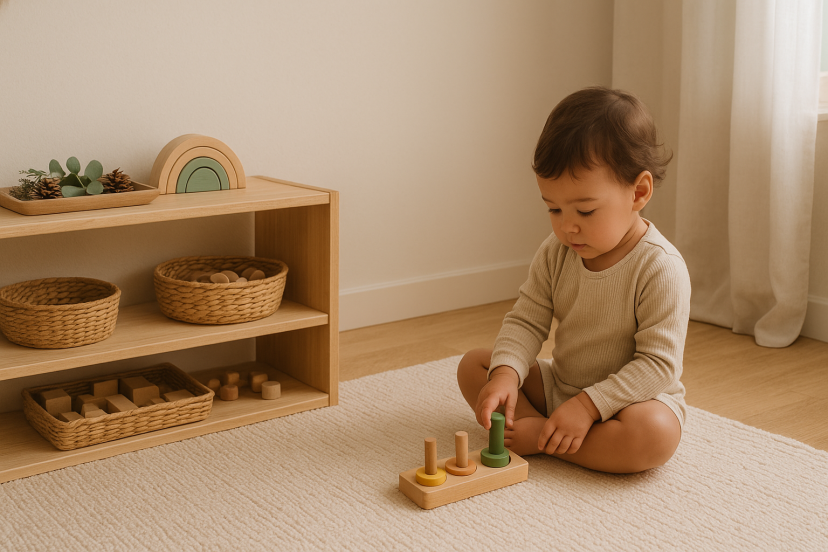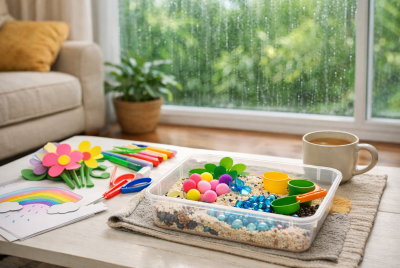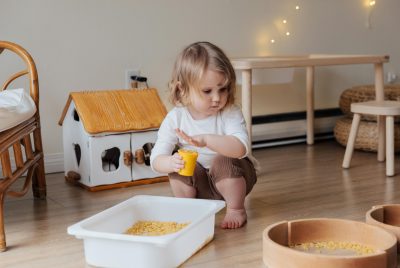Montessori-Inspired Play: 5 Natural Toy Setup Ideas for Little Ones
We may earn a commission for purchases made using our links. Please see our disclosure to learn more.
You know that feeling when toys are everywhere… but your child still seems “bored”?
Good news: you don’t need a picture-perfect playroom or a closet full of fancy materials. You just need a few simple setups, some natural toys, and a shift from “How do I entertain my child?” to “How can I support my child’s curiosity?”
In this guide, we’ll unpack what Montessori-inspired play really means, share five natural toy setups you can try this week, touch on research-backed benefits, and walk through a few carefully chosen Montessori-style products.
What Is Montessori-Inspired Play?
Montessori-inspired play at home does not mean turning your living room into a full classroom.
At its core, it’s about:
- Child-led exploration instead of constant adult-led “activities”
- Real, purposeful tasks mixed with play
- Simple, open-ended toys that don’t beep, flash, or talk at your child
You become less of an entertainer and more of a guide: you observe, prepare the space, offer choices—and then step back so your child can dive into their own play.
Why Natural, Simple Toys Work So Well
Think about a plain wooden block. An adult sees a block. A child sees a car, a phone, a bridge, a bed for a tiny animal, something to stack, line up, knock over, and rebuild.
That’s the power of open-ended, natural toys. They:
- Invite imagination instead of prescribing a storyline
- Offer rich sensory feedback—weight, texture, sound
- Create a calmer, less overwhelming visual environment
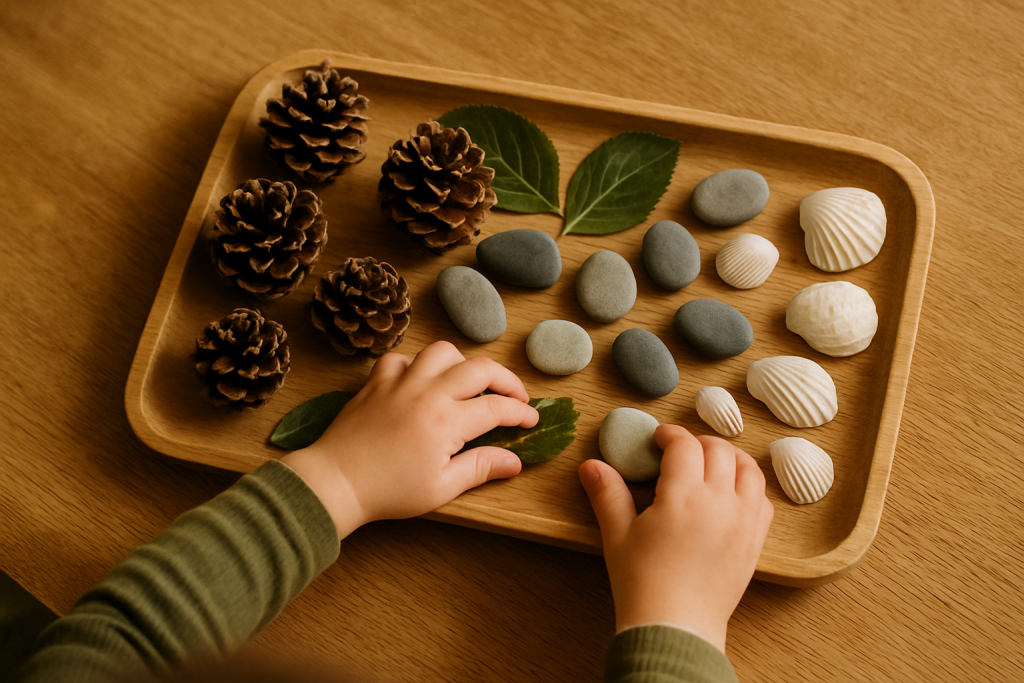
Core Principles for Your Montessori Play Space
You don’t need to follow every Montessori rule to benefit from the philosophy. These simple principles will take you far:
- Everything at child height. Low shelves, baskets, hooks they can reach.
- Order and simplicity. Each toy has a “home,” and there aren’t too many out at once.
- Real objects when possible. Tiny pitchers, small brooms, real kitchen tools.
- Respect for concentration. When your child is focused, you avoid interrupting.
- Freedom within limits. “You may choose anything from the shelf” still sits inside clear boundaries.
When you keep these in mind, your Montessori-inspired play corner almost designs itself.
Montessori-Inspired Play by Age
Babies (0–12 Months)
For babies, Montessori-inspired play is about movement and gentle sensory experiences. Think:
- A safe floor space instead of lots of gear
- A low mirror to watch their own movement
- One or two simple toys at a time
Toddlers (1–3 Years)
Toddlers are little scientists who want to pour, carry, scoop, and repeat. Offer:
- Simple pouring or transferring with beans or water
- Basic puzzles and shape sorters
- Real kitchen tasks like washing veggies or stirring batter
Preschoolers (3–6 Years)
Preschoolers can handle more complex challenges and love “real” work:
- Counting with objects, early letter sounds, matching games
- Fine-motor tasks like tweezers, beads, and lacing
- Practical life skills: folding cloths, wiping spills, setting the table
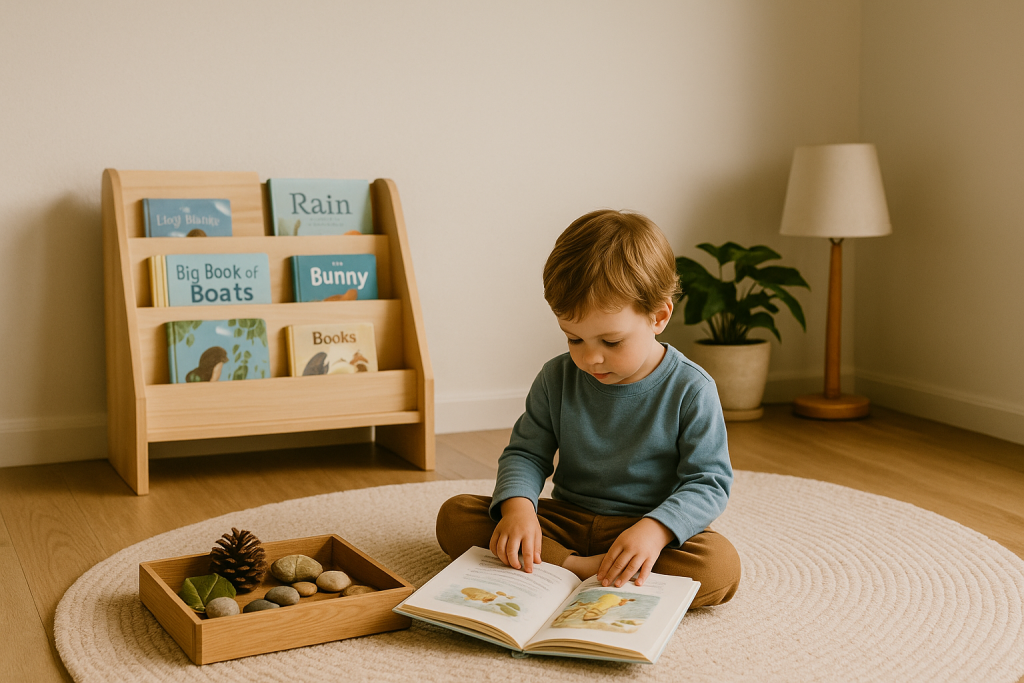
Setup 1: Open-Ended Wooden Shelf
Picture a single low shelf with four or five activities:
- Wooden blocks
- A small basket of animals or people
- A stacking toy
- A couple of simple vehicles or figures
Place each toy in its own basket or tray with space around it. Show your child where each item “lives” and how to put it back. That sense of order is very Montessori—and it makes cleanup easier for you too.
Setup 2: Practical Life Station in the Kitchen
Montessori-inspired play loves real work. With a sturdy step stool or learning tower, your child can:
- Wash fruits and vegetables
- Help rinse dishes
- Stir batter or whisk eggs
Keep a low basket of child-safe tools nearby: a sponge, tiny spray bottle, small bowl, and spoon. You’re building independence, coordination, and confidence—all while doing tasks you needed to do anyway.
Setup 3: Nature Tray and Outdoor Basket
Nature is the original sensory bin. Create a simple nature tray indoors with:
- Pinecones, stones, shells, seed pods
- A small magnifying glass
Near the door, keep a “nature basket” ready with a bag for collecting treasures and a sunhat or mittens. Invite your child to sort, match, and describe what they find.
Setup 4: Cozy Reading and Storytelling Corner
Books are a huge part of Montessori-inspired play, especially when kids can choose them on their own. Set up:
- A front-facing bookshelf or a low crate
- A few cozy cushions or a rug
- 8–12 books at a time, rotated regularly
Encourage your child to pick a book for quiet time or bedtime. That simple act of choosing builds independence and a love of reading.
Setup 5: Fine Motor & Sensory Work Area
Set aside a small table or defined mat as a “work” space. Rotate in:
- A wooden busy board
- Tweezers and pom-poms
- Beads and string for threading
- Playdough with natural tools
Keep only a few options available. When your child stops using something, swap it out rather than piling more on the table.
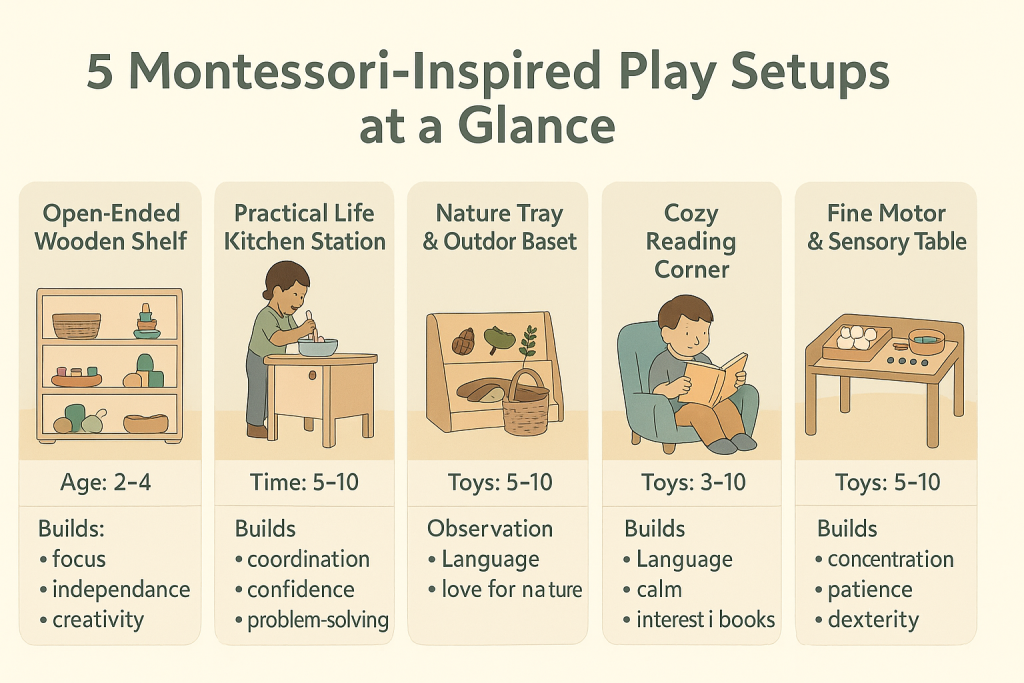
Toy Rotation Made Simple
Toy rotation doesn’t need a spreadsheet. Try this:
- Keep most toys in a closet or bin.
- Choose around 8–12 activities to live on the shelves.
- Every week or two, quietly swap out a few based on what your child uses.
Ask yourself: What are they obsessed with right now? What’s the next tiny challenge? This keeps play fresh without constant shopping.
Montessori-Inspired Play on a Budget
You can absolutely do this without a designer budget. Some low-cost ideas:
- Stainless steel bowls, whisks, and wooden spoons
- Recycled containers for stacking, nesting, and pouring
- Cloth napkins for folding and sorting
- Nature treasures as “loose parts”
Montessori-inspired play is less about branded materials and more about intentional, child-sized access to real life.
Research-Backed Benefits of Montessori-Inspired Play
If your brain likes evidence, here’s the reassuring part: Montessori-inspired play and play-based learning are well supported by research.
One lottery-based longitudinal study in the U.S. found that children in public Montessori preschools showed stronger academic performance, better social understanding, and higher enjoyment of school compared with children in traditional settings. You can read the original findings in this longitudinal study on Montessori preschool outcomes.
A broader framework paper on learning through play concluded that play-based learning supports cognitive development, social-emotional skills, engagement, and inclusion in school-age children. It emphasizes how choice, curiosity, and joy built into play improve outcomes over time. You can explore those insights in this framework for learning through play in schools.
Both lines of research point in the same direction: when children have space for joyful, guided-but-child-led play, they build the kind of self-regulation, problem-solving, and love of learning that lasts.
And while you’re focusing so much on your child, your own well-being matters too. If you’d love a little inspiration for feeling seen and cared for as a caregiver, you might enjoy this gentle guide to meaningful, practical gifts for parents that actually support you, not just add clutter.
Amazon Picks: Montessori-Inspired Toys That Work Hard
If you want to invest in a few high-impact pieces, these Montessori-style options pair beautifully with the setups above.
Onshine Large Wooden Blocks for Toddlers 1–3
A classic set of 64 smooth wooden blocks in different shapes with a wooden storage box.
- Best for: Open-ended building, stacking, and pretend cities
- Pros: Durable, versatile, used across many ages
- Cons: Box is a bit bulky; needs floor space
Potatomato Montessori Large Busy Board
A wooden busy board with multiple latches, switches, and hands-on elements.
- Best for: Fine motor practice and sensory exploration
- Pros: Many activities in one compact piece
- Cons: Needs supervision for kids who still mouth everything
Little Partners Foldable Toddler Tower
A sturdy learning tower that lets your child safely reach counter height.
- Best for: Practical life in the kitchen or bathroom
- Pros: Adjustable, stable, encourages independence
- Cons: Higher price; takes up space when open
Nuoex Montessori Bookshelf for Toddler 1–5
A front-facing wooden bookshelf sized for small hands.
- Best for: Independent book choosing and tidy reading corners
- Pros: Simple design, encourages kids to return books
- Cons: Holds fewer books than a traditional shelf
Promise Babe Wooden Tree Toys
A sweet little wooden “forest” set with trees, houses, and peg dolls.
- Best for: Nature-themed small-world play and storytelling
- Pros: Beautiful colors, mixes well with blocks and trains
- Cons: Small pieces require supervision with younger toddlers
Comparison Table at a Glance
| Model | Key Use | Price Tier* | Best For |
| Onshine Large Wooden Blocks | Open-ended building | $$ | All ages, long-term play |
| Potatomato Montessori Large Busy Board | Fine motor & sensory exploration | $$ | Busy toddlers and preschoolers |
| Little Partners Toddler Tower | Practical life at counter height | $$$ | Daily kitchen and bathroom routines |
| Nuoex Montessori Bookshelf | Reading corner organization | $$ | Book lovers in small spaces |
| Promise Babe Wooden Tree Toys | Imaginative small-world setups | $ | Storytelling and nature-themed pretend |
*Approximate, based on typical online pricing.

Balancing Montessori with Real Family Life
You don’t have to be a “perfect Montessori parent” for this to matter. You can:
- Own plastic toys and natural ones
- Allow some screen time and protect stretches of independent play
- Use Montessori-inspired setups in a tiny apartment or shared bedroom
The goal isn’t aesthetic perfection. It’s giving your child space to explore, repeat, and feel capable.
Montessori-Inspired Play FAQs
How many toys should I keep out at once?
Most families find that 8–12 activities on shelves (not counting books and big items) is plenty. If your child is scattering everything, try offering fewer choices.
Is Montessori-Inspired Play only for wealthy families?
No. The heart of Montessori-inspired play is child-led exploration, real tasks, and order. You can use thrifted items, everyday kitchen tools, and nature finds instead of brand-name materials.
Can Montessori-Inspired Play work in a small space?
Absolutely. A single low shelf, a reading corner, and a small work table or mat are enough. Focus on accessibility and calm, not square footage.
How do I start Montessori-Inspired Play with a baby?
Give your baby time on the floor with room to move, one or two simple toys, and a low mirror. Avoid constantly switching toys; let them repeat movements and explore at their own pace.
Do I have to follow Montessori “rules” perfectly?
No. If you’re offering choices, respecting your child’s concentration, and creating a simple, child-friendly space, you’re already bringing Montessori-inspired play into your home—beautifully and imperfectly.

